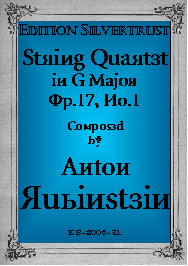Presents
Anton Rubinstein
String Quartet No.1 in G Major, Op.17 No.1
 Anton
Rubinstein (1829-1894) was one of the great piano virtuosi of the 19th
century with a technique said to rival that of Liszt. He also gained renown as a
composer and conductor.
Anton
Rubinstein (1829-1894) was one of the great piano virtuosi of the 19th
century with a technique said to rival that of Liszt. He also gained renown as a
composer and conductor.
Rubinstein was one of those rare concert virtuosi whose contribution to music went far beyond performing. In 1862, he founded the St. Petersburg Conservatory and served as its first director. His efforts in developing Russian musical talent were perhaps the greatest of any single individual. Not only did he introduce European educational methods but he also established standards that were as rigorous as any conservatory in Europe.
While Rubinstein's compositions were extremely popular during his lifetime, after his death, they were criticized because they showed "no Russian influence" and were viewed as derivatives of prominent European contemporaries, especially of Mendelssohn. Despite the fact that commentator after commentator has repeated this assertion, almost as if it were a litany, it is nonetheless not entirely accurate. Although he was not part of the so-called emergent Russian national school as led by Rimsky Korsakov, it is not true that there is no Russian influence to be found in his music. This influence is just not as pronounced as in the works of Borodin, Mussorgsky or of Korsakov himself. However, listeners to Rubinstein's String Quartet No.1, which dates from the mid 1850's, will not only hear the influence of Mendelssohn, but also hear Russian melody and rhythm of the sort used by Borodin and others 20 years later. Certainly the Presto, with its lovely trio in particular, sound quite a lot like the music Borodin penned in the 1870's.
Rubinstein was a prolific composer writing in nearly every genre. Chamber music figures prominently amongst his works. He wrote 10 string quartets, at least 5 piano trios, a string quintet and a string sextet as well as several other chamber works. Writing of Rubinstein's string quartets, Wilhelm Altmann, the famous chamber music critic notes:
"Rubinstein, despite the fact that he was a piano virtuoso, wrote very skillfully for strings and it is beyond dispute that he mastered classical string quartet compositional technique." Of String Quartet No.1 in particular, he continues, "The first movement, Moderato, has for its main subject an especially suitable theme for string quartet, while the impressive second subject is both rich and pregnant with possibilities. The song-like second movement, Andante con moto, is of great elegance. The Presto which serves as a scherzo is based on a lively, playful figure. The finale, Allegro moderato, begins with a somewhat passionate, very characteristic quartet-like melody which leads to an ingratiating, lyrical second theme."
This quartet is well-written for all and filled with fresh and strikingly beautiful melodies which both players and listeners alike will enjoy.
Parts: $24.95